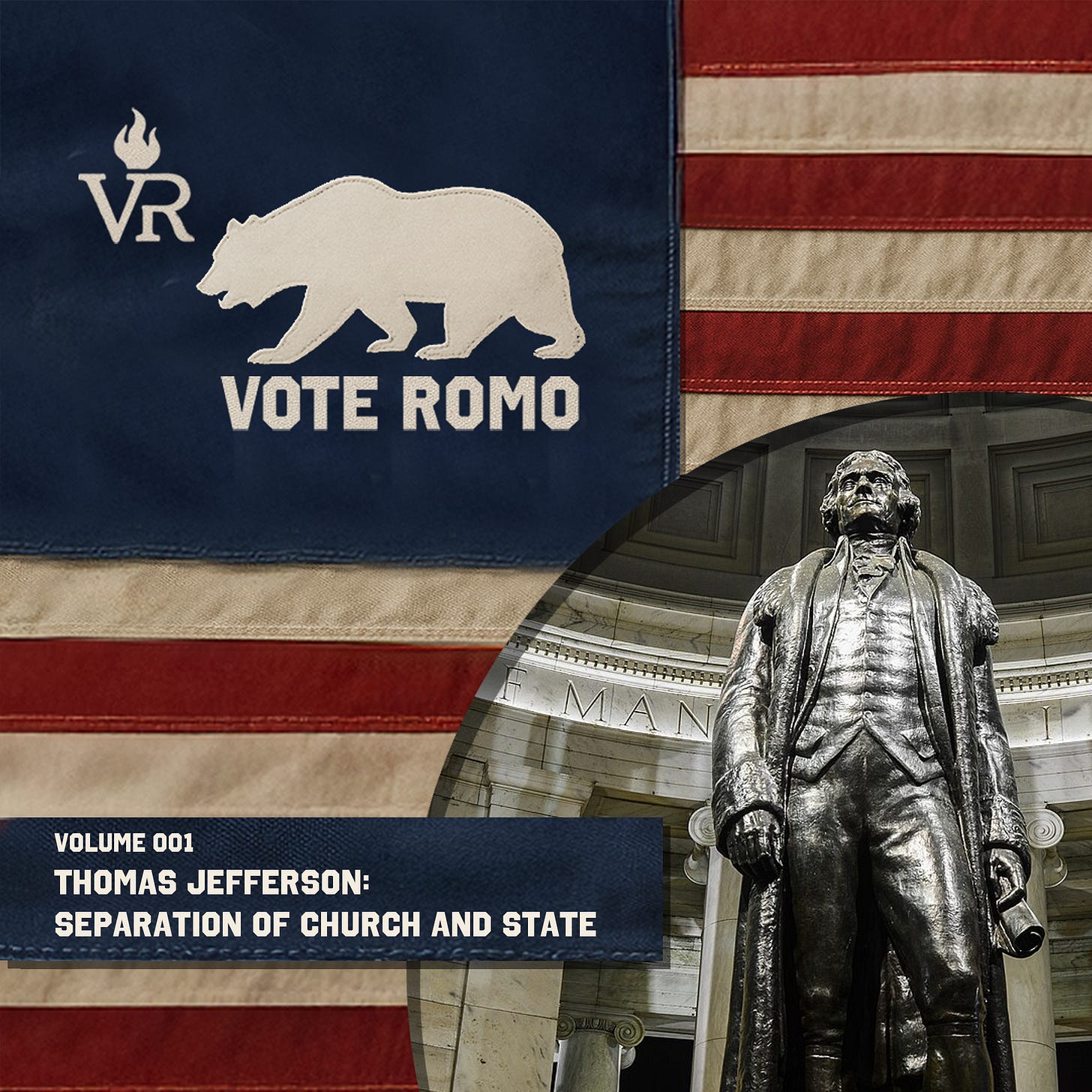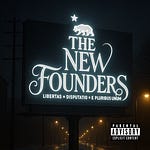Jefferson: Church and State
As I campaigned for office, a truth became evident: many of our fellow citizens lack a firm grasp of our nation’s history. Another reality, plain to all who observe, is the deep polarization that divides us. Too often, people shy away from open debate on the issues that matter most. Yet, like many of you, I am driven by a desire to engage, to listen, and to understand the perspectives of those around me.
The New Founders are committed to fostering honest public discourse. We will invite voices from every corner of the political landscape, offering a platform where ideas can be aired and tested (some will write anonymously and freely).
What follows is my first contribution, a deliberate counterpoint to an argument advanced by Texas Democrat James Talarico. His position, firmly rooted in one perspective, called for a response from the opposing view. We aim to provide balance, to present a media landscape enriched by competing ideas. We hope you find it thought-provoking.
In the quiet corridors of American public schools, where the echoes of history mingle with the chatter of young minds, a debate simmers that reaches back to the nation’s founding. It concerns the place of ancient texts—the Bible, the Ten Commandments—in the classroom, not as instruments of evangelism, but as pillars of moral and legal wisdom.
Today, this question arises anew in discussions like that between podcaster Joe Rogan and Texas state representative James Talarico, who opposes a bill mandating the display of the Ten Commandments in every public school classroom. Talarico, drawing from his own tradition, warns that such measures erode the boundary between church and state, potentially marginalizing students of diverse faiths or none at all. As he put it: “I grew up in a tradition that cherished the separation of church and state… any attempt to erode that boundary, I feel like I have a special obligation to speak out against it.”
Yet, to understand this boundary fully, one must turn to the early Republic, where the Bible was not a stranger to education but a familiar companion. Throughout the 19th and early 20th centuries, it appeared in American schools as a source of shared moral principles, its use only curtailed in the 1960s by court rulings invoking the First Amendment’s establishment clause.
For the Founders, including Thomas Jefferson, such texts were less divine mandates than repositories of universal ethics, akin to the works of Seneca, Epictetus, Locke, Montesquieu, Hume, Voltaire, and Cicero that filled Jefferson’s library. He even owned a Qur’an, reflecting his curiosity about comparative religious and legal systems, and once noted that Stoic philosophy sometimes offered more practical moral guidance than parts of the Bible itself.
The phrase “separation of church and state,” so central to Talarico’s argument, emerges not from the Constitution but from Jefferson’s pen. In his letter to the Danbury Baptists on January 1, 1802, he wrote:
“Believing with you that religion is a matter which lies solely between Man and his God, that he owes account to none other for his faith or his worship, that the legitimate powers of government reach actions only, and not opinions, I contemplate with sovereign reverence that act of the whole American people which declared that their legislature should ‘make no law respecting an establishment of religion, or prohibiting the free exercise thereof,’ thus building a wall of separation between Church & State.”
This “wall,” often invoked to bar religious texts from public spaces, was meant to protect liberty, assuring a small congregation that their worship would remain free from governmental interference.
But Jefferson’s words, examined in their fuller context, reveal no blanket exclusion of religious principles from public life. On that same day, in a letter to his Attorney General, Levi Lincoln, he clarified:
“I consider the government of the United States as interdicted by the Constitution from intermeddling with religious institutions, their doctrines, discipline, or exercises.”
Here, the separation is between institutions—the church as a governing body, led by clergy, and the civil state—not between the moral teachings of the Bible and the laws of the land. Jefferson viewed the church not merely as a spiritual haven but as a potential rival authority, capable of tyranny if fused with political power. As he warned in a letter to Jeremiah Moor on August 14, 1800:
“The clergy, by getting themselves established by law, & ingrafted into the machine of government, have been a very formidable engine against the civil and religious rights of man.”
This fear stemmed from the experiences of those who fled Europe—Puritans, Protestants, Huguenots—escaping systems where kings ruled by divine right and churches enforced doctrine with force. Jefferson hoped America’s model would inspire change abroad, writing to Richard Price on January 8, 1789:
“I am persuaded that our religious liberty here will be a model to other nations, and that no country in Europe will be able to persecute under the mask of religion.”
What he opposed was not the Bible’s influence but the bishop in the senate chamber, not prayer but proclamation, not faith but theocracy.
Indeed, the American experiment drew deeply from Judeo-Christian values, embedded in the first five books of the Bible—the Torah—and extending through the Ten Commandments. Principles like natural rights, freedom, self-governance, and the dignity of the individual, which underpin the Constitution and Declaration, owe much to this tradition, forged through human trials against tyrants and kings.
The Decalogue, far from uniquely Christian, reflects ethical foundations common to many traditions, yet it sits not far beneath the nation’s founding documents, alongside Enlightenment thought from Moses to Locke. Jefferson himself was not averse to incorporating such religious texts into society and law; he resisted only clerical control over legislatures, courts, and governance.
The separation he championed was a two-way street: the state could not impose doctrines, but neither should it purge moral wisdom from public discourse or education. As the provided sources emphasize, the law of the land belongs to the people, not the pulpit, and changes require the consent of citizens—a two-thirds vote for amendments, not the erasure of our historical roots.
In this light, introducing ancient texts like the Bible and the Ten Commandments in classrooms need not breach Jefferson’s wall. Rather, it honors the Founders’ vision: studying them as sources of moral guidance, alongside diverse philosophies, fosters understanding of the nation’s ethical bedrock. For if we exclude them, we risk forgetting that the American framework—Judeo-Christian at its core—has sustained liberty for over two centuries.
To teach these texts is not to establish religion, but to illuminate history, encouraging students (and the public) to grapple with the principles and ancient wisdom that shaped their world. In schools, where future citizens form their character, such inclusion could bridge divides, reminding us that moral education, drawn from ancient wellsprings, strengthens the Republic without compelling or requiring a shared belief.
Jefferson, ever the student of human nature, would well approve.
VR











